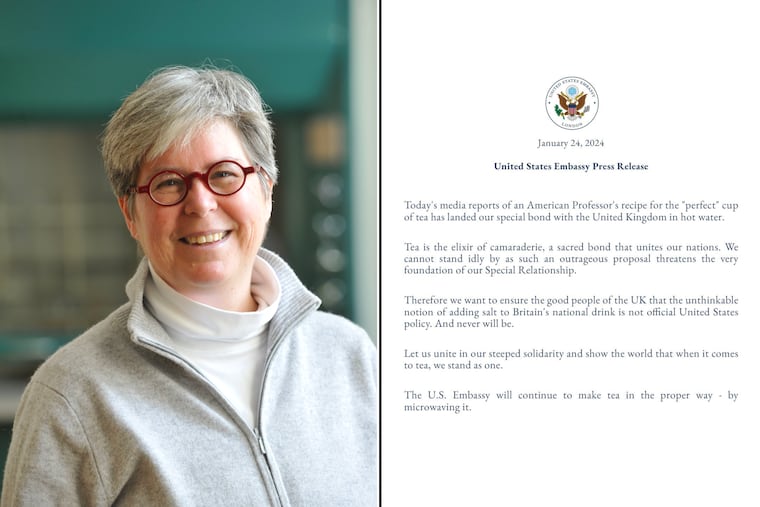Bryn Mawr professor has the Brits salty over her tea-making techniques
She’s in hot water.

Bryn Mawr College chemist Michelle Francl’s book, Steeped: The Chemistry of Tea, hit shelves on Wednesday. Now, her advice to add a pinch of salt has the United Kingdom up in arms — including the U.S. Embassy in London.
Francl’s book leans on her day-to-day chemistry knowledge to enhance and explain the tea-making process. She suggests a squeeze of lemon to break up the scum that sits on the water’s surface and says she likes dunking and squeezing her tea bags — all innocent enough. But Francl’s suggestion to add a dash of salt was one step too far for British tea lovers.
Now, she’s going viral across the pond for it.
The author’s sacrilege sodium suggestion has been smeared across British news outlets’ headlines and on TV, as reported by the Washington Post.
» READ MORE: How science can help you make a better cup of tea and why a Bryn Mawr scientist wrote a book about it
“American scientist reveals her secret to the perfect cup of tea … but adding hot milk and SALT risks leaving Brits at boiling point,” a headline in the Daily Mail said. ITV News did taste tests in Manchester tea rooms using Francl’s advice. One tester compared the salted tea to “seawater.” Another called it “absolutely awful.”
Despite the distress the idea of salt in tea has prompted in Britain, it’s not a new concept altogether. Francl explains in her book that salt blocks the receptor that makes tea taste bitter. Some bean heads do the same in their cups of coffee. Mongolian tea and Tibetan butter tea (po cha) also use a pinch of salt.
Still, the Brits weren’t having it. They dogged on Francl’s willingness to make tea in the microwave — “microwave” was trending Wednesday evening on British Twitter — and they piled on over the salt thing.
Tempting fate, Francl has doubled down on her hot takes: She also insists that when milk is added to the equation, it should be warm, while the Brits commonly like it cool.
The controversy caused the U.S. Embassy in London to join in on the discourse, issuing an “important statement on the latest tea controversy.”
“Tea is the elixir of camaraderie, a sacred bond that unites our nations. We cannot stand idly by as such an outrageous proposal threatens the very foundation of our special relationship,” the embassy said. “Therefore we want to assure the good people of the UK that the unthinkable notion of adding salt to Britain’s national drink is not official United States policy. And never will be.”
The embassy closed with a final jab, adding that its staff will continue to make tea the proper way: “by microwaving it.”
The British government weighed in by responding on X (formerly Twitter), “We appreciate our Special Relationship, however, we must disagree wholeheartedly … Tea can only be made using a kettle.”
Francl commented on the controversy and the embassy’s statement. “My book has diplomatic implications!” she wrote.
Francl, who spoke to The Inquirer about her book ahead of its publication, did not respond to a request for additional comment about the dispute.